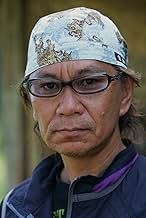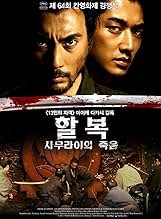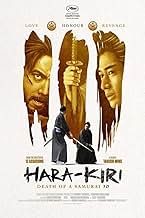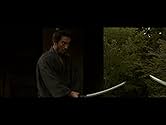NOTE IMDb
7,3/10
9,8 k
MA NOTE
Un conte de vengeance, d'honneur et de déshonneur, portant sur un samouraï miséreux qui découvre le sort de son gendre samouraï errant, le poussant à un affrontement vengeur sans pitié contr... Tout lireUn conte de vengeance, d'honneur et de déshonneur, portant sur un samouraï miséreux qui découvre le sort de son gendre samouraï errant, le poussant à un affrontement vengeur sans pitié contre le fief d'un seigneur féodal.Un conte de vengeance, d'honneur et de déshonneur, portant sur un samouraï miséreux qui découvre le sort de son gendre samouraï errant, le poussant à un affrontement vengeur sans pitié contre le fief d'un seigneur féodal.
- Réalisation
- Scénario
- Casting principal
- Récompenses
- 6 nominations au total
Eita Nagayama
- Motome Chijiiwa
- (as Eita)
Gorô Daimon
- Priest
- (as Goro Daimon)
Avis à la une
Takashi returns to the samurai world after the success of '13 assassins' in 2011. This movie was a remake of 1962 'Harakiri' which was also a massive hit movie. I have not seen the original but this movie blown me away. As usual the story opens slow and hard to identify the situation of the story but at the right middle of the movie the flashback strikes with awesome drama about poverty and family sentiment. Once the flashback was told you will easily say where the movie is heading. The story was classic and the movie was presented with rich cinematography. The first digital 3D movie for Takashi Miike as well the first 3D movie to premier at 2011 Cannes film festival.
You have to learn a word to understand the movie completely. 'Seppuku' - which means ritual suicide committed by a samurai. So that is why it's called 'Hara-kiri: death of a samurai'. You must have patience during opening sequences, without character and story development you will be in a tough position to understand about what's going on. While the story and character progress with the development you will start to get and you may fall for the emotion parts if you are a tenderhearted. And also you will be uncomfortable during 'seppuku' scene.
Takashi Miike's career best, this is what already everyone saying about it. But Its to hard to say which was his best, I like many of his works. I might be overwhelmed by the watch but will be happy to recommend it to others. I was very little unhappy for the ending scene otherwise I could have said it is the best of Takashi's work.
I am so curious about Takashi Miike's upcoming and Hollywood debutante project 'The outside' with Tom Hardy. Expecting it would be another 'The last samurai', I wish a good luck to the team.
You have to learn a word to understand the movie completely. 'Seppuku' - which means ritual suicide committed by a samurai. So that is why it's called 'Hara-kiri: death of a samurai'. You must have patience during opening sequences, without character and story development you will be in a tough position to understand about what's going on. While the story and character progress with the development you will start to get and you may fall for the emotion parts if you are a tenderhearted. And also you will be uncomfortable during 'seppuku' scene.
Takashi Miike's career best, this is what already everyone saying about it. But Its to hard to say which was his best, I like many of his works. I might be overwhelmed by the watch but will be happy to recommend it to others. I was very little unhappy for the ending scene otherwise I could have said it is the best of Takashi's work.
I am so curious about Takashi Miike's upcoming and Hollywood debutante project 'The outside' with Tom Hardy. Expecting it would be another 'The last samurai', I wish a good luck to the team.
This is the film about life and how hard it can be. What a true warrior should aim for and what does it mean to be a man of action. Very interesting film with an exceptional rhythm of story telling. At first flow of the film looked too slow for me, but after warming up I did truly enjoy it. As I got very sharp emotional feelings form this very melodramatic remake of Original Harakiri (1962), at the and of the film I've got a special gift, something which will be an interesting suggestion for life and a different angle of view for it.
It would've taken guts to remake one of the most acclaimed Japanese films of all time (1962's Harakiri), but then again, no one could accuse Takashi Miike of being a gutless filmmaker. I was curious to see this because some of Miike's best films are remakes or updates of stories that have already been adapted to film (like 13 Assassins and Graveyard of Honour).
This remake really follows the original perhaps a little too closely. I think it's just a few minutes shorter, and I can really only think of one scene that was in the original that wasn't in this. Visually, it replicates Masaki Kobayashi's style really well, but maybe part of me was hoping that Takashi Miike would do something a little more out-there or unexpected. Instead, he chose to be reverent to the original, but then again, it is a classic film that deserves reverence.
There's one infamous scene from the original that feels even harder to watch here, and I think the climax shakes things up a little too, to mixed effect (the final fight is fairly different). Otherwise, the story and all the characters are near-identical, and anyone familiar with the 1962 version is unlikely to find too many surprises here.
It's strange to try and review this, because it is a high-quality film... yet it's based on a high-quality classic that still holds up extremely well, so I'm not entirely sure what the rationale was behind this. For those who want to see a more modern-looking version of Harakiri in colour instead of black and white, this is very well-made and watchable, but I feel like the original is still more worthy of being watched first, for anyone unfamiliar with either film.
This remake really follows the original perhaps a little too closely. I think it's just a few minutes shorter, and I can really only think of one scene that was in the original that wasn't in this. Visually, it replicates Masaki Kobayashi's style really well, but maybe part of me was hoping that Takashi Miike would do something a little more out-there or unexpected. Instead, he chose to be reverent to the original, but then again, it is a classic film that deserves reverence.
There's one infamous scene from the original that feels even harder to watch here, and I think the climax shakes things up a little too, to mixed effect (the final fight is fairly different). Otherwise, the story and all the characters are near-identical, and anyone familiar with the 1962 version is unlikely to find too many surprises here.
It's strange to try and review this, because it is a high-quality film... yet it's based on a high-quality classic that still holds up extremely well, so I'm not entirely sure what the rationale was behind this. For those who want to see a more modern-looking version of Harakiri in colour instead of black and white, this is very well-made and watchable, but I feel like the original is still more worthy of being watched first, for anyone unfamiliar with either film.
The Japanese cinema used to be much more powerful in the past. This remake of classic masterpiece Harakiri is far worse in many ways. It toned down criticism of authority, that is the core of the original movie. The central story is overdrawn, and it does not bring much new. What is new in this presentation is almost always at a loss, spare a somewhat simpler structure. Acting is also better in the original. But what is most annoying, is that some key subtle points are missing in this version, almost as if they were not understood, or worse yet, almost if hypocrisy of the authorities is to be whitewashed. It is far less powerful rendering of the story, it lacks authenticity that Kobayashi had with his then contemporary comments. By all means, if you can, see the original first. One of the least justified and worst remakes. However, when the original is so great, this lazy if not outright stupid remake still leaves us with a somewhat shabby but not too bad a movie. It is a disappointment coming from a director that had better days, and especially from a cinematography that seems to have grown tired, and has been surpassed by South Korea but also China to an extent.
It's a good film. I didn't see the original and so I wasn't tainted by how they compare, or the book either. It probably made this film a little hard to understand because the chronology jumps around and there are a lot of flashbacks - but I stuck with it and it did begin to make sense. The movie is a basically a tragedy that also dissects the samurai code and provides some thought provoking material to consider. The movie is reasonably well paced and for a Japanophile the set design and costumes are very well done. I don't know if Japan was that squeaky clean and tidy 400 years ago, but it seemed well considered and accurate. The movie was a little slow but portrayed a sort of Zen tranquility, so it worked for the mood or atmosphere. You could pick apart this movie, and it may not stand up to the original but if you're a fan of Japanese cinema it's definitely worth seeing.
Le saviez-vous
- AnecdotesThe first 3D title ever to be shown in official selection at the Cannes Film Festival.
- GaffesAs the wooden wakizashi is pushed into the stomach (after the tip snapped off), you can see that the blade is sliding into the handle.
- Citations
Hanshirô Tsugumo: A warrior's honor is not something simply worn for show!
- ConnexionsFeatured in At the Movies: Cannes Film Festival 2011 (2011)
Meilleurs choix
Connectez-vous pour évaluer et suivre la liste de favoris afin de recevoir des recommandations personnalisées
- How long is Hara-Kiri: Death of a Samurai?Alimenté par Alexa
Détails
- Date de sortie
- Pays d’origine
- Sites officiels
- Langue
- Aussi connu sous le nom de
- Hara-Kiri: Death of a Samurai
- Sociétés de production
- Voir plus de crédits d'entreprise sur IMDbPro
Box-office
- Montant brut aux États-Unis et au Canada
- 75 688 $US
- Week-end de sortie aux États-Unis et au Canada
- 10 920 $US
- 22 juil. 2012
- Montant brut mondial
- 5 435 358 $US
- Durée
- 2h 8min(128 min)
- Couleur
- Mixage
- Rapport de forme
- 2.35 : 1
Contribuer à cette page
Suggérer une modification ou ajouter du contenu manquant



















